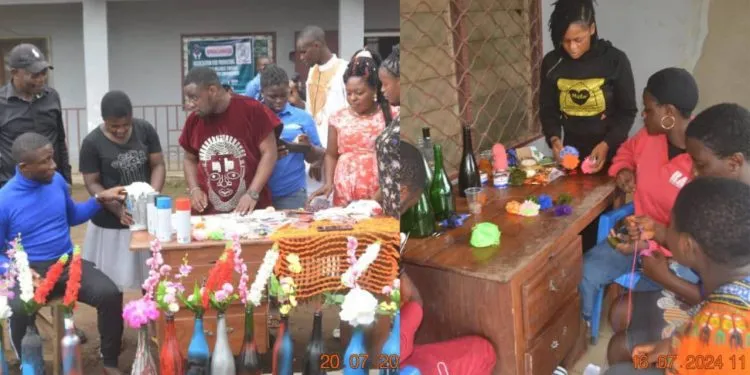In 2019, Human Rights Watch published a report that said, as a result of the Anglophone armed conflict, “People with disabilities have faced attack and abuse by belligerents, often because they are unable to flee.” Now, instead of allowing conflict to plague them, they are rewriting their stories.
For years now since the escalation of the Anglophone armed conflict, Eposi Elisabeth, 40, has been confined only around her home.
She is a person with a mobility disability. Before the crisis, she could roll around and go to distant places in her wheelchair. But now, she can only spin around Bonduma, Buea, where her house is.
“I hardly leave the house because I don’t know what can happen at any moment,” she told MMI.
“At first, I used to leave the house and go about my activities. But when they start shooting, I am grounded since everyone is running for safety,” she added.
Being impounded at home, life has become very difficult for her economically. But with those challenges taking a toll on her, she will not let them define her.
Recently, Elizabeth joined over 25 youths with disabilities where they were trained on income-generating activities.
This was the initiative of some Buea-based NGOs that have the plight of people with disabilities at heart.
They were trained in crochet, bead-making, and interior decor.
“It has always been my dream to learn something, especially one that can generate income,” she said.
“We learned how to transform nothing into something, that is, picking bottles or cement and recycling them into flower jars for interior decor. I also learned to bead. How to make earrings and bangles,” she added.
She said they have gone to school, but the government can’t employ everybody.
“So we have to look at some other corners where we can excel,” she told MMI.
“Recycling and decor are things I have always wanted,” she said, but doing it on her own, she never knew the secret until the training.
“Seeing me smile, the sky is going to be the only limit to what I want to do with these skills.
It is like a dream come true. I am going to immediately put these skills into practice,” she said.
As she talked, her face was illuminated with smiles and joy.
She was not the only one. Other youths with disabilities who have the skills could also boast of the numerous things they will do with them to make themselves economically independent.
“What I expected was so little compared to what I have acquired,” said Meh Begajum, a student with a visual impairment who also took part in the training.
“What I learned from here will help improve my financial situation when I am in school. My sighted peers can easily rush to building construction sites and get something for their pockets, but this will be like my own construction site to do something and get money while schooling,” he said.
The NGO that impacted the lives of youths with disabilities said the Anglophone conflict has further exacerbated the already deplorable conditions of persons with disabilities in the two regions.
“Persons with disabilities have lost hope. They have been affected so much by the Anglophone crisis, whose humanitarian schemes have not been inclusive of their needs. A lot of them have been suffering from trauma, depression, and other mental health complications,” said Kesah Princely, founder of the Foundation for the Inclusion and Empowerment of Persons with Disabilities.
His organisation partnered with three other civil society organizations to impact the lives of the trainees.
“For five days, we were able to teach them the art of being able to put food on their table. We have gotten to the stage where people with disabilities should take their destiny into their own hands. That means they should champion activities that can make them breadwinners. We have been talking to them about mental health, self-esteem, and developing their goals for a decent future,” he added.
While they do these, they hope more policies can be put in place to look into the situation of people with disabilities.



